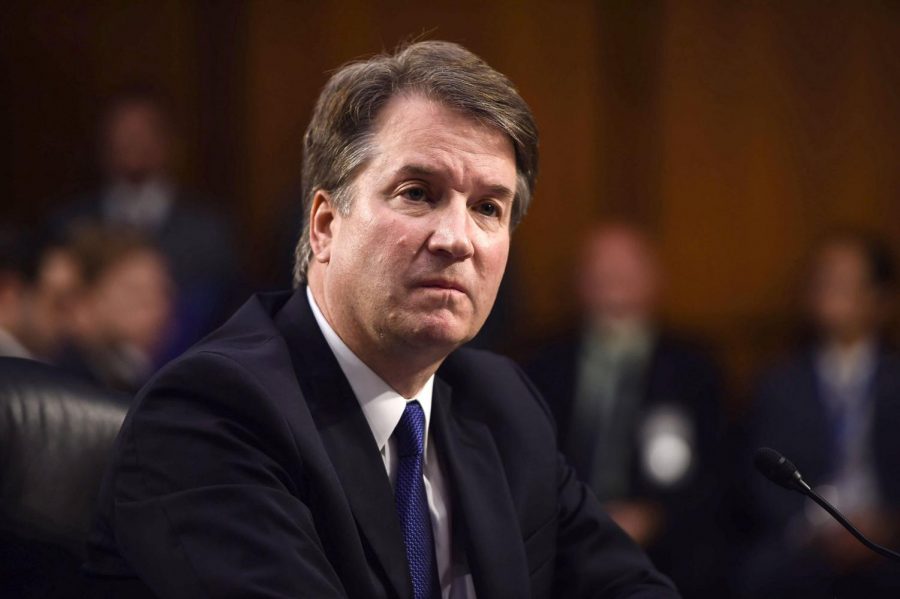Why Kavanaugh Must Not Be Confirmed
Brett Kavanaugh during his hearing
September 24, 2018
When I hear the name Brett Kavanaugh, I can’t help but think of Merrick Garland—President Obama’s Supreme Court nominee who was caught in the crossfire of partisan division before the 2016 presidential election and was thus never confirmed. When I hear the name Brett Kavanaugh, I remember his dreadful track record regarding women’s rights to reproductive health, specifically the right to abortion—in the case Garza v. Hargan, he opined that an undocumented immigrant could not obtain an immediate abortion, even though she had clearly expressed that she wished to have one. When I hear the name Brett Kavanaugh, I’m reminded of Congressional Republicans’ attempt to keep documents regarding his time as an aide in George W. Bush’s administration hidden from the public eye. Yet the primary reason I believe Kavanaugh must not be “speedily confirmed,” as Congressional Republicans would have it, to the highest court in the land is the recent, very formidable allegation by Professor Christine Ford of Palo Alto University that Kavanaugh attempted to sexually assault her at a high school party.
By now, Ford’s allegations are widely known. She alleges that in the early 1980s, when both she and Kavanaugh were high schoolers attending private schools in and around suburban Washington D.C., she once attended a house party where a drunken Kavanaugh attempted to sexually assault her, muffling her by putting his hand over her mouth and apparently being so clumsily forceful in the process that she later stated she “thought he might inadvertently kill” her. She managed to escape after Kavanaugh’s friend, the controversial conservative writer Mark Judge, jumped on the bed, giving her time to flee the party.
Ford’s allegations are credible. Although she didn’t report the incident at the time, notes from therapy sessions indicate that she has talked about the attempted assault in the past. According to her husband, in the past, Ford expressed concern that Kavanaugh—the same boy who had allegedly held her down and groped her—could one day be nominated to the Supreme Court. As such, when Trump did just that, she decided to write anonymously to her representatives in Congress, including Senator Dianne Feinstein, with her story. Seeking to bolster her credibility, Ford even voluntarily took a polygraph test—which, yes, have a reputation for unreliability, but her obvious willingness to do so may say enough already—administered by an agent of the FBI and passed. For months, she sought to keep her story anonymous; there are no indications that she made the accusation against Kavanaugh with the intent of seeking fame.
Perhaps predictably, though, Ford’s credibility—and personal safety—has been assailed right from the moment her identity was revealed. One notable Twitter conspiracy thread proposed to a user base of more than 300 million people the notion that Ford might have somehow been assaulted by someone who happened to look exactly like Kavanaugh. President Trump questioned why Ford hadn’t come forward in the 1980s, as a terrified teenage girl in a time when sexual harassment had only just been declared a type of illegal sex discrimination, and “immediately filed [charges] with local Law Enforcement Authorities.” Ford has even been forced to move out of her house due to the ever-mounting number of death threats she’s received.
After a tense week of negotiations—in which some Congressional Republicans signaled that they would be willing to hold a vote on Kavanaugh almost immediately if Ford did not testify, all while Ford and her lawyer called for an FBI investigation into her allegations—Ford has indeed apparently agreed to testify publicly this Thursday about the assault.
Yet many, from Republicans in Congress to ordinary Americans, seem convinced that Kavanaugh is the one truly being victimized. Some, including Senator Lindsey Graham of South Carolina, have suggested that it doesn’t seem prudent to “ruin” Kavanaugh’s life over the allegations. While Graham at least appears open to hearing from Ford and perhaps reconsidering this stance, others seem convinced that the fact that Kavanaugh was a teenager when the assault allegedly happened should erase any potential wrongdoing. One Republican woman even had the gall to ask a uniquely disturbing question: “What 17-year-old boy hasn’t done this in high school?”
I am certain that the majority of seventeen-year-old boys at Tenafly High School and around the United States—and, indeed, eighteen-year-old boys and sixteen-year-old boys and fifteen-year-old boys and fourteen-year-old boys—have not attempted to sexually assault someone. From a young age, school-children around the United States have been taught to not hurt others, to respect others’ wishes, to act kindly. A seventeen-year-old Kavanaugh, however inebriated, should have known better than to nonconsensually grope and silence Ford. His alleged act shows a weakness of character, a fault which cannot be afforded in a man who may be appointed to a life-long position on a bench which is constantly determining the future of our nation.
We have been told by right-wing pundits to think about the deep pain the allegations are causing Kavanaugh and his family. Yet, I would venture that none of these pundits have stopped to consider the pain Kavanaugh’s actions caused Ford, whose life has been affected by the alleged assault since she was fifteen and who has even attended therapy in hopes of encountering some sort of elusive recovery.
An FBI investigation would not be, as Trump has claimed, superfluous or outside the realm of the FBI’s expertise. The FBI routinely conducts background checks on nominees and officials and has the power to investigate further if necessary. Additionally, when Anita Hill levied sexual harassment accusations against then-Supreme Court nominee Clarence Thomas in 1991, the FBI conducted an investigation as well.
On the other side of the aisle, however, I have seen what I can only categorize as bitter resignation. Some have declared, in remarkably defeatist tones, that nothing will occur—that even if an FBI investigation does occur, the Kavanaugh-Ford case will simply become another Anita Hill incident. Anita Hill, who painstakingly described to an all-male Senate Judiciary Committee how Thomas had made deeply inappropriate sexual comments to her. Anita Hill, who was perhaps one of the first to reveal how uniquely terrible it is to be a woman in a hostile work environment you cannot afford to leave. Anita Hill, whose FBI investigation was so brief, so surface-level, that perhaps it shouldn’t be so shocking that Thomas was nevertheless confirmed by the Senate. Anita Hill, who was smeared as “a little bit nutty and a little bit slutty” by conservative writers.
But it has been twenty-seven years since 1991. We have witnessed the rise of #MeToo, watched as Al Franken resigned and Roy Moore lost in deep-red Alabama, heralded a new generation of female candidates for political office. I can state today, with relative certainty, that if Bill Clinton had run for president today and Paula Jones had come forward with the same allegations of sexual misconduct by Clinton, we would weigh her accusations more heavily than the quick dismissals of Clinton’s supporters.
I don’t believe that Kavanaugh will be arrested. After all, the statute of limitations on Ford’s accusations has expired—she herself undoubtedly knows that. Yet this was never a question of if Kavanaugh would be led out of Congress in chains with hulking police officers by his side. The confirmation of a Supreme Court Justice is, again, a question of character. If Ford’s allegations are true, then Kavanaugh will be revealed as a man with a corrupt, reprehensible character. Yet there is no way to determine this—even if she testifies, as she likely will, this Thursday—without a thorough FBI investigation, in this climate where many Congressional Republicans seem deeply determined to turn the allegations into merely another “he said, she said” situation and thus confirm Kavanaugh as swiftly as possible.
I hope times have changed enough that we will see such an FBI investigation come to fruition and do its work not with a cursory gaze, but with a sincere determination to uncover the truth. We owe it to Anita Hill. We owe it to Professor Ford. And we owe it, above all, to the American people.

















































































































































